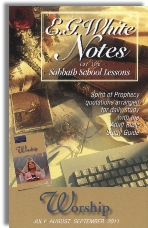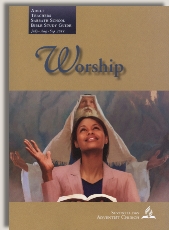|
||||||||||||||
Commentary on "Worship and the Exodus: Understanding Who God Is"
Day 5: Wednesday, July 6, 2011 - "These Be Your Gods..."
Overview
This lesson covers Exodus 32:1-6, where Israel demanded Aaron make them a god to worship because Moses was gone from sight. The lesson analyzes the situation by concluding that the Israelites’ worship of the golden calf was licentious revelry and that it is human nature to rise no higher than what we worship.
The lesson also draws the lesson that just as Israel became restless and demanded a substitute god because Moses delayed, Seventh-day Adventists need to learn this lesson as the second coming is delayed. The lesson ends with the question, “How can we make sure that we, our own worship, do not fall into the same trap” of giving into the culture and diluting pure worship?
Observations
Again, this chapter in Exodus reveals God, not information about how to worship properly. The entire question of worship is irrelevant unless we know God through the Lord Jesus. It does not matter what or how we participate in worship if we are not made alive by the Spirit through the blood of Jesus. Everything we do, unless we are born again, counts for absolutely nothing, even if we do very good, very humanitarian things. The works of non-born again people are just works of the flesh, and they do not recommend us to God in any way, not even slightly (Phil. 3:1-9).
Moreover, doing good works in the name of Jesus counts for nothing if we do not know Him.
That being said, Exodus 32 tells us significant things about God and how we are to relate to Him. Note Matthew 7:21-23:
“Not everyone who says to me, ‘Lord, Lord,’ will enter the kingdom of heaven, but the one who does the will of my Father who is in heaven. On that day many will say to me, ‘Lord, Lord, did we not prophesy in your name, and cast out demons in your name, and do many mighty works in your name?’ And then will I declare to them, ‘I never knew you; depart from me, you workers of lawlessness.’”
Knowing Jesus means being born of the Spirit; apart from this new birth, we can neither see (perceive) nor enter into the kingdom of heaven (Jn. 3:3-5).
In Exodus 32, the Israelites forgot God. They had only recently heard God speak the Ten Commandments to them, and in just a few days they broke the first three. Exodus 32:8 is written in the plural form in the Hebrew where God tells Moses to go down and intervene:
They have turned aside quickly out of the way that I commanded them. They have made for themselves a golden calf and have worshiped it and sacrificed to it and said, ‘These are your gods, O Israel, who brought you up out of the land of Egypt!’” (Ital. ours).
When Israel worshiped the golden calf, they engaged in polytheism. The golden calf apparently represented characteristics or attributes of more than one pagan god, and Israel worshiped this representation of false gods. In doing so, they broke the first commandment and honored other god(s) over God alone.
Not only did they break the first commandment, but they broke the second and the third as well. They made a graven image of a pagan god, an express breaking of the second command, and they called it “Yaweh”—or, perhaps, they engaged in a syncretistic combination of Yaweh-worship with worship of pagan gods mixed in. Either way, they took the name of the Lord God in vain. They were not worshiping God, because they were specifically doing what God had told them not to do. The only true worship of God is the worship He commands us to do.
In verses 2-4 Aaron is apparently left to choose what god he will give Israel, and he chooses a gold calf. The Hebrew word underlying “golden calf” is a word that specifically refers to a young bull between the ages of one and three years old. Thus this god is not a weak, helpless creature but a creature that represents two things of value: power and fertility. Apparently Aaron chose to produce a god that represented some form of nature worship.
The fact that the Israelites’ worship was characterized by their rising up to play tells us they were incorporating pagan customs into their professed worship of Yaweh. The New Testament frequently links idolatry and immorality and commands believers to flee idolatry and immorality. Whenever we worship the true God in a false way, we break the second commandment...as Israel did that day.
Idols of the mind and heart
John Calvin said, “The human mind is a factory of idols.” Israel resorted to using visible images to represent the object of their worship. Even if they had tried to visually represent God, they would have created and worshiped an idol. It doesn’t matter what we think of god; what matters is what God says about Himself. We must worship Him as He is, not as we like to describe or think of Him.
Idols are functional substitutes for God, and we become like what we worship. Psalm 115:8 says this about idols we create,
Those who make them become like them; so do all who trust in them.
Adventism has a specific problem with a functional substitute for God. They have equated the character of God with the Law, or the Ten Commandments. They call the Decalogue the “transcript of God’s character”. Yet Scripture teaches something completely different. The law was given to “increase sin” (Rom 5:20). It was given because of sin, holding God’s people
“captive under the law, imprisoned until the coming faith would be revealed” (Gal. 3:22).
The Lord Jesus came as God’s full and final word to us:
Long ago, at many times and in many ways, God spoke to our fathers by the prophets, but in these last days he has spoken to us by his Son, whom he appointed the heir of all things, through whom also he created the world. He is the radiance of the glory of God and the exact imprint of his nature, and he upholds the universe by the word of his power. After making purification for sins, he sat down at the right hand of the Majesty on high…(Heb. 1:1-3).
The law was given specifically to lead us to Christ, to reveal to us that we were dead in sin and completely unable, even by prayer and will-power, to obey the law. The law was given to bring us to our faces before the cross of the Lord Jesus and accept His blood as payment for all our sin, even the sins we have not yet committed. The law was given to reveal that we are sinners, not given to show us how to please God.
We only please God when we acknowledge our deep and innate sin and repent, receiving the cleansing of His blood and the new birth by His Spirit. Then, it is Christ—not the law—that embodies the heart of God.
Adventism says that the law is the heart, the character of God. Wrong. Jesus is the “transcript” of God to us. The law was a shadow that Jesus fulfilled (Col 2:16-17). We do not show we love God by keeping the law; we become enabled to love God by bowing before the Lord Jesus and receiving His payment for our sin. We become reconciled to God only by the blood of Jesus. The law plays no role in our righteousness or or sanctification. The law does not represent God. Jesus represented the Father, and when we receive Him, we are united to the Father as well by His resurrection life which His Spirit gives our spirits when He comes to indwell us.
Adventism has been worshiping a graven image: the tablets of stone carved by the finger of God. How ironic…the very physical representation that God gave His people of His commitment to them until His Son would come has been turned into an idol, an object of worship in the minds of Adventists.
The law does not summarize God. It confirms the identity of Jesus, but it was a mere shadow, and expression of the old covenant God gave to Israel. Jesus is the fulfillment of every single promise and intent of the law. Even righteousness is ours when we are in Christ—not because He helps us keep the law but because His personal righteousness is credited to our account. The Father looks at us and sees Jesus; His own eternal righteousness is credited to us. His Spirit gives us new hearts, but the law is not the means of our sanctification. Rather, learning to submit our temptations and the lusts of our flesh to the indwelling Holy Spirit, submitting to God instead of struggling with temptation, is what produces sanctification.
And at any rate, our sanctification has nothing at all to do with our salvation. It does not qualify us to stay saved, nor does it help us to become saved. It is only fruit of our salvation; God holds and keeps us when we are His (Jude 2).
I implore you: ask God to show you who He really is and to reveal to you how to approach and worship Him as He desires you to do.
Summary
- Israel broke the first three commandments when they worshiped the golden calf.
- Aaron chose the symbol of the golden calf which was actually a symbol of a young bull.
- We break the second commandment whenever we worship God in any way other than the way He instructs us to worship Him.
- The Lord Jesus is the only way we can approach and worship God.
- Adventism has made a god out the Ten Commandments, calling it the “transcript of God’s character”.
- Jesus is the “transcript” of God’s character (Heb. 1:1-3); the law was merely a shadow of Jesus who is the full revelation of God (Col 2:16-17).
- Keeping the law does not contribute to nor continue our salvation.
- Our righteousness is 100% the personal righteousness of Jesus credited to our account; we do not “become righteous” by His helping us obey.
- Once we are righteous, born again and credited with Jesus’ righteousness, His Spirit changes us and gives us the ability to submit to Him instead of struggling with our flesh.
- God keeps us saved; our obedience never keeps us right with God.
The insights in the first part of this lesson were from Gary Inrig’s sermon “Golden Calves” on Exodus 32 given July 3, 2011. You can access the sermon here: Gary Inrig, "Golden Calves"
Copyright 2011 BibleStudiesForAdventists.com. All rights reserved. Revised July 4, 2011. This website is published by Life Assurance Ministries, Glendale, Arizona, USA, the publisher of Proclamation! Magazine. Contact email: BibleStudiesForAdventists@gmail.com.
The Sabbath School Bible Study Guide and the corresponding E.G. White Notes are published by Pacific Press Publishing Association, which is owned and operated by the Seventh-day Adventist church. The current quarter's editions are pictured above.
Official Adventist Resources
Standard Edition Study Guide Week 2
Teacher's Edition Study Guide Week 2
Easy Reading Edition Study Guide Wk 2
Search the Complete Published Ellen G. White Writings
Please Support This Project


